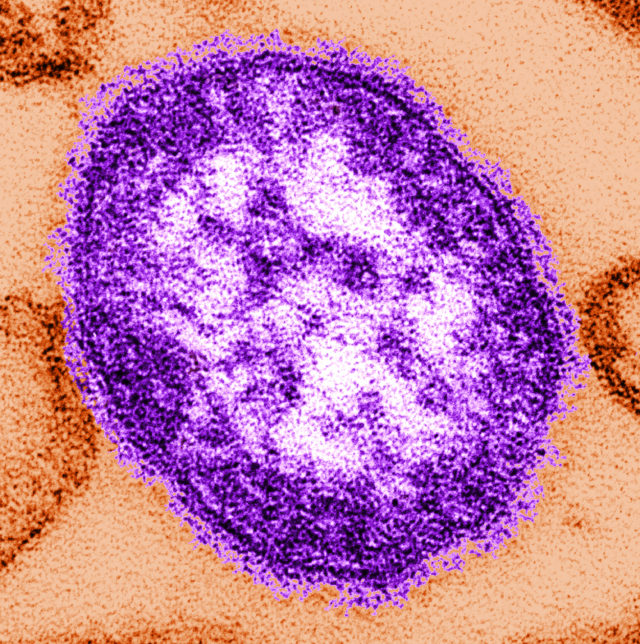The World Health Organisation (WHO) has issued a fresh warning over measles after an almost 45-fold rise in cases across Europe.
Experts from the organisation said Europe is seeing an “alarming rise” in the spread of the disease, which has “accelerated in recent months”.
Some 42,200 cases were reported by member states in 2023, almost 45 times the 941 cases in 2022.
Two in five cases were in children aged one to four, while one in five were among people aged 20 and over.
The rising trend is expected to continue if people do not vaccinate their children against the disease, WHO said.
It comes after the UK launched its own campaigns to encourage parents to get the measles, mumps and rubella (MMR) vaccine for their children.
Measles can lead to serious complications, lifelong disability and death.
It can affect the lungs and brain and cause pneumonia, meningitis, blindness and seizures.
Dr Hans Kluge, WHO regional director for Europe, said: “Vaccination is the only way to protect children from this potentially dangerous disease.

“Urgent vaccination efforts are needed to halt transmission and prevent further spread.
“It is vital that all countries are prepared to rapidly detect and timely respond to measles outbreaks, which could endanger progress towards measles elimination.”
WHO said that sliding vaccination rates were to blame, but more people were now travelling abroad after Covid-19, increasing the risk of cross-border disease transmission and spread within communities.
On Friday, the head of the UK Health Security Agency (UKHSA) warned the UK is on a “trajectory for everything getting much worse” when it comes to measles spreading,
Professor Dame Jenny Harries told the PA news agency that “concerted action” is needed to tackle the virus, as she visited a measles blackspot in the West Midlands.
She suggested the majority of people are not against their child receiving the MMR jab, but that they need more information to feel confident about their decision.
She added: “What we are seeing at the moment with measles is that people have forgotten what a serious illness it is…
“We have had very high vaccination rates, especially for young families, but they are low at the moment.”
Measles is highly infectious and can be passed on even before a rash appears.
Make sure your child is protected from becoming seriously unwell from measles by making sure they are up to date with their MMR vaccinations.
Find out more ➡️ https://t.co/pGbmMXqcSf pic.twitter.com/p87M3cpLX7
— NHS (@NHSuk) January 16, 2024
Vaccination rates across the country have been dropping, but there are particular concerns about some regions, including parts of London and the West Midlands.
Figures released by the UKHSA on Friday showed there have been 216 confirmed measles cases and 103 probable cases in the West Midlands since October 1 last year.
Four-fifths (80%) have been found in Birmingham while 10% were identified in Coventry, with the majority being in children aged under 10.
The UKHSA has declared a national incident, which it said is an internal mechanism signalling the growing public health risk and enabling it to focus work in specific areas.
Official figures show uptake of the vaccine is at its lowest point in more than a decade.
In 2022/23, some 84.5% of youngsters in England had received both doses of the jab by the time they were five years old – the lowest level since 2010/11. Some 92.5% had received one dose.

Mike Tildesley, professor of infectious disease modelling at the University of Warwick and an expert in disease spread and Covid, said the R number for measles – the number of people that one infected person will pass the illness on to – is much higher than for Covid.
“This means we need over 90% of the population to be immune or you’re going to start seeing cases growing,” he said.
“We have childhood vaccinations for measles which for many years have helped us to get rid of the disease.
“Unfortunately, if those vaccination levels drop then we will start to see cases going up and that’s what we are seeing at the moment.”




Why are you making commenting on The Herald only available to subscribers?
It should have been a safe space for informed debate, somewhere for readers to discuss issues around the biggest stories of the day, but all too often the below the line comments on most websites have become bogged down by off-topic discussions and abuse.
heraldscotland.com is tackling this problem by allowing only subscribers to comment.
We are doing this to improve the experience for our loyal readers and we believe it will reduce the ability of trolls and troublemakers, who occasionally find their way onto our site, to abuse our journalists and readers. We also hope it will help the comments section fulfil its promise as a part of Scotland's conversation with itself.
We are lucky at The Herald. We are read by an informed, educated readership who can add their knowledge and insights to our stories.
That is invaluable.
We are making the subscriber-only change to support our valued readers, who tell us they don't want the site cluttered up with irrelevant comments, untruths and abuse.
In the past, the journalist’s job was to collect and distribute information to the audience. Technology means that readers can shape a discussion. We look forward to hearing from you on heraldscotland.com
Comments & Moderation
Readers’ comments: You are personally liable for the content of any comments you upload to this website, so please act responsibly. We do not pre-moderate or monitor readers’ comments appearing on our websites, but we do post-moderate in response to complaints we receive or otherwise when a potential problem comes to our attention. You can make a complaint by using the ‘report this post’ link . We may then apply our discretion under the user terms to amend or delete comments.
Post moderation is undertaken full-time 9am-6pm on weekdays, and on a part-time basis outwith those hours.
Read the rules here